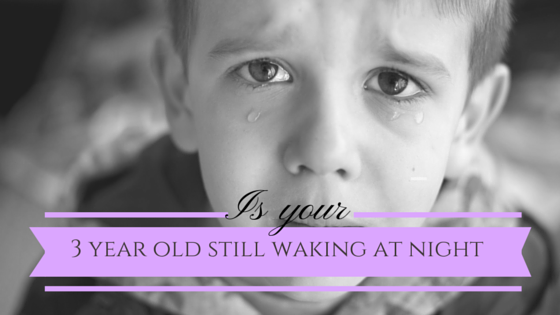Your 3 year old still waking up at night?
Posted on

It’s a common assumption that babies and toddlers outgrow their poor sleeping habits, on occasion that can be true, many children can outgrow poor sleep habits and sleep longer at night those children and families are fortunate but what about those babies and toddlers who don’t. I get many enquiries from mothers who are still struggling with getting their 3 & 4 year olds to sleep all night.
Contrary to previous thoughts children don’t just wake up overnight out of hunger. They wake up for various other reasons too but figuring out the cause of sleep reistance can be tricky
I’ve mostly found that children under 2 waking overnight for various reasons other than just hunger. There’s usually a physical or emotional developmental reason for overnight waking. Physical factors can include, being hungry, being cold, having a bowel movement, newly developed physical skills & milestones reached can also play havoc with your little ones sleep, teething, learning to sit up or stand up. Emotional triggers could be separation anxiety, or new changes in the babies home environment or daily routine. It’s considered completely normal to have a child wake up overnight up to 2 years old. But for toddlers over two it's considered that physical reasons for waking can be & usually are diminished. So what’s the reason for this constant night waking with your 3 year olds? Again in my experiences children over 2 and half who are still often waking up at night are doing so for emotional or behavioural reasons. If you have been coping with constant night waking from birth up to 3 years plus it’s simply a matter of helping you child create new sleep habits. Not easy you think? Perhaps not easy but fairly simple when you know how.
Shaping an older child's sleep can have it advantages. That fact that I can explain to a toddler as well as demonstrate what going to happen is useful. They can communicate back. With babies it can be difficult to find out what is causing them distress because all they can do is cry, with a toddler you can get a better understanding of the situation because they can actually tell you. This does also have its disadvantages.
Supposing you have a child that HATES bedtime and sleeping with a passion and will quite happily tell you so too. Situations like this can lead to a battle of wills between parent and child. The child refusing to go to sleep and the parent reasoning, bargaining & sometimes bribing their little ones back to sleep....or worse giving in and letting their toddlers stay up. You don’t want to bargain with your child about sleep. At this age and stage of your child’s development a good night’s sleep is essential for all that brain growth and development. And quite frankly sleeping at night is non-negotiable. That’s the mind-set I feel a parent should have when dealing with night waking. At night parenting doesn’t stop. Your child needs to know that if they need you, you will be there but other than that night time is for sleeping, full stop. It’s not about winning a battle with your child it’s about making them feel safe and secure but ultimately its sleep time.
Children need boundaries and rules. Call me old fashioned but everyone knows where they are when boundaries & rules are in place in solving sleep problems in over 2s I have one basic rule. Between the hours of 7pm & 7am children should be in bed asleep, going to sleep, being asleep or waking up. Once a child is over 2 years old there isn't really any PHYSICAL reason why a baby needs to wake up and/or stay awake over night for food or the like unless they are ill. If my child has woken up at night and needs me during the night she can have my full attention but once her needs are met or problem solved it time for sleep. By needs I mean the need to feed, urinate or make your sleep space safe for your child to sleep other than that what other reason does a toddler need to be awake for at that time of night? If your toddler is distressed or having a nightmare or unwell then of course tend to them give them the physical and emotional support they need however these scenario are temporary or one offs, not a nightly occurrence! If this happening nightly this is a habit..... If your child has emotional needs at night finding a way to address those needs during the day rather than at night will help and then encouraging new habits at night can begin. One possibility is a child who is seeking your attention or needs that emotional attachment from you as a parent is doing so during night hours because of lack of availability or access to you during the day.
For example I had a mum come to me for help with her 3 year old daughter who was constantly getting up at night to come into her mother room, she’d either request milk water, a trip to the toilet or simply to get into her mother’s bed. Mum had noticed this starting of as a once a night occurrence but then it quickly escalated to a few times a night as the weeks passed. She noticed her daughter was much more irritable as a result of these increased night waking, she began having meltdowns and tantrums and her mum was really starting to get stressed. I asked mum if there had been any recent changes to their home life, Mum stated that she had just started a new job and that her 3 year old little lady had now increased her hours at nursery from part time to full time...
After hearing the history I suspected that this mums 3 years old was more anxious and perhaps was having a tough time adjusting to this new routine, she was missing her mother now that her work hours had increased To help mum reduce the night waking I complied some tips and advice for her to try. I got a phone call a week “OMG thank you so much we had the night waking stop within 3 days I’m amazed! She no longer has her meltdowns and she wakes up really happy here are the tips I gave her. Try them out I’m certain you will see results
To help break the habit of night waking you can try some of the following tips.
1. If you suspect your child is feeling anxious about something hence needing more of your attention, plan some extra one on one time during the day and/or extend your bedtime routine with them. Include some time where it's just you and them and give them that quality time that they need. A lot of night waking in older toddlers is about attention seeking. We need to meet this need for our attention but at time that suits both parent and child. Your 3 year may think they need your attention at 3am but they need their sleep much more.
2. Rule out the possible need to ask for blankies, water, milk, cuddles and the like by planning ahead. If they get thirsty have a beaker of water by their bed within arm’s reach for them, make sure they have any comfort items with them and load up on the kisses and cuddles before you say good night.
They will use the need of these things as diversion or delay tactics throughout the night. Stay one step ahead of them. We need to avoid the long drawn out process and get out of debating with them over them. Remember that night times for them need to be BORING. So that they get to understand the only thing worth doing at night is sleeping.
3. If they need you or call you, go to them the first time. Talk to them, check they are ok. If it's a matter of them getting up and coming to your room, check they are ok and then put them back in their bed. If they get up again, say nothing other than "it's time to sleep now “and take the, back to bed.
If they get up again after that say nothing and take them back to bed, do this as many times as necessary till they stay in their bed and go back to sleep. But say nothing. This step can be the most difficult and frustrating but this is when you need to be consistent and firm. Don’t get annoyed or show any signs of frustration, to your child, show no negative emotion and just lead them back to bed. Kiss them goodnight and leave. Remember night time needs to be boring. The only thing worth doing at night is sleeping. You HAVE to be consistent with this from this night forward, all night every night. Don't enter into discussion with them at all. If they are distressed by all means comfort them, but don't speak, or enter into a conversation with them use your non-verbal communication to let them know you are there for them if they need you but it's time to sleep. Once they calm they must go back to bed.
4. In the morning no matter how many times you had to take them back to their own room, give them encouragement for staying in bed and sleeping,(if & when they did stay in bed) let them know that you are proud of the and be really encouraging. I know this can be tough to do if you have had a tough night but children respond to praise and encouragement for the things that they CAN do. So that’s what we need to focus on. Even if you took him back to bed 35 times, if he stayed in bed the 36th time and went to sleep, let him know you are happy he could do that. Making the extra effort to give him the attention from you that he needs the following morning and throughout the day can really help him and you sleep better at night
5. be confident and be consistent. If you know you want to change and shape your child's sleep you have to be persistent and consistent your approach, changing things on a day to day basis only confuses your little one and draws out the process. Your child has learnt that they can get your attention when they wake up rather than just relaxing back off to sleep. Without your encouragement and support they won't do it on they're own. We have to give our children the opportunity to be independent in a skill before we can truly know if they are capable and it's the same with sleep. Your child may cry at first but by being consistent they will quickly learn and understand and adapt. Children are much more capable at adapting than us adults.
Give my steps a try and let me know how you get on. Join my private FB group and meet other mums in the same boat as you and see how they got on implementing my steps.
If you need my help email me or send me a message on Facebook

